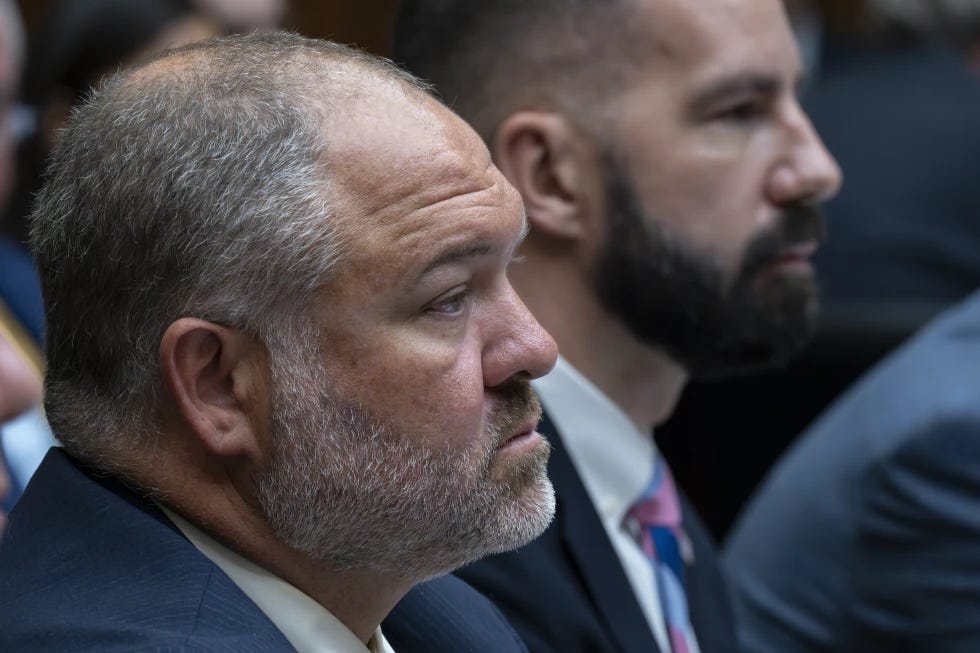Image From AP.
Welcome to the InsightBit podcast, where we dive deep into the economic and financial issues shaping America’s future. Today, we’re tackling a story that’s been making waves in Washington: the sudden ouster of Gary Shapley as acting IRS commissioner, just days after his appointment, and the broader turmoil engulfing the Internal Revenue Service under President Donald Trump’s second term. This isn’t just a tale of bureaucratic reshuffling—it’s a saga that touches on taxpayer trust, government efficiency, and the delicate balance of power within one of America’s most critical agencies. We’ll verify the facts, analyze the implications, propose a path forward, compare perspectives, and empower you to draw your own conclusions. Let’s get started.
Verification
The news of Gary Shapley’s removal as acting IRS commissioner broke on April 18, 2025, first reported by The New York Times and swiftly corroborated by major outlets like the Associated Press, Reuters, CNN, NBC News, and The Washington Post. According to these sources, Shapley, a career IRS criminal investigator and whistleblower who testified about the Hunter Biden tax investigation in 2023, was appointed acting commissioner on April 15, 2025, only to be replaced within days by Deputy Treasury Secretary Michael Faulkender. The decision stemmed from a clash between Treasury Secretary Scott Bessent and Elon Musk, who heads the Department of Government Efficiency (DOGE), a Trump administration initiative aimed at slashing federal spending.
Primary evidence supports these claims. Bessent’s X post on April 18 confirmed Faulkender’s appointment, stating, “Trust must be brought back to the IRS, and I am fully confident that @TreasuryDepSec Michael Faulkender is the right man for the moment.” He also noted that Shapley would remain a senior Treasury advisor, continuing a year-long reform investigation alongside fellow whistleblower Joseph Ziegler. The Associated Press, citing three anonymous sources, reported that the IRS paused its planned layoffs of up to 20,000 employees—roughly 25% of its workforce—due to the leadership upheaval. This pause was echoed by Reuters and CNN, reinforcing the story’s consistency.
Additional context comes from prior IRS leadership changes. Shapley replaced Melanie Krause, who resigned over a controversial IRS-Department of Homeland Security (DHS) data-sharing agreement to aid immigration enforcement. Krause had succeeded Douglas O’Donnell, who retired in February 2025 amid concerns over DOGE’s access to taxpayer data. These transitions align with reports of internal unrest, with anonymous IRS officials telling CNN the agency was in a “state of chaos.” No official IRS statement has contradicted these accounts, and Bessent’s public remarks align with the reported narrative. The convergence of primary statements, anonymous sources, and cross-outlet reporting verifies the authenticity of this news.
Context: A Storm at the IRS
The Internal Revenue Service, responsible for collecting over $4.9 trillion in annual revenue (based on 2024 IRS data), is a linchpin of the U.S. economy. It processes over 160 million individual tax returns yearly, issuing refunds averaging $2,800, and enforces tax laws that fund everything from defense to Social Security. Yet, since President Trump’s second inauguration in January 2025, the IRS has been a lightning rod for controversy, marked by four leadership changes in four months: Danny Werfel (departed on Inauguration Day), Douglas O’Donnell, Melanie Krause, and Gary Shapley, with Michael Faulkender now the fifth. This instability coincides with aggressive policy shifts, including mass layoffs, data-sharing deals, and attempts to revoke tax-exempt statuses, all under the shadow of Trump’s efficiency agenda led by DOGE.
Shapley’s ouster is a microcosm of these broader tensions. A career IRS agent, he rose to prominence as a whistleblower, alleging in 2023 that the Justice Department slow-walked its investigation into Hunter Biden’s taxes. His testimony before Congress earned him praise from Republicans, including Senator Chuck Grassley, who urged Bessent to elevate Shapley to a leadership role. However, his appointment, reportedly orchestrated by Musk without Bessent’s knowledge, sparked a power struggle that led to his swift removal. This incident highlights not only internal administration rivalries but also the IRS’s precarious position as it navigates political pressures, workforce cuts, and public scrutiny.
Stakeholders: Who’s Involved?
To understand the stakes, let’s identify the key players:
Gary Shapley: A polarizing figure, Shapley’s whistleblower status made him a hero to conservatives but a lightning rod for critics who questioned his claims of DOJ interference. His brief tenure as commissioner was seen as a bold move to reform the IRS but ended abruptly, raising questions about his future influence.
Michael Faulkender: A Trump loyalist, Faulkender served as Assistant Secretary for Economic Policy during Trump’s first term and was confirmed as Deputy Treasury Secretary in March 2025. Bessent views him as a stabilizing force, but his interim role faces scrutiny as the Senate delays confirming a permanent commissioner.
Scott Bessent: As Treasury Secretary, Bessent is tasked with overseeing the IRS and ensuring fiscal stability. His clash with Musk over Shapley’s appointment underscores his determination to assert control, but his public feud risks alienating Trump’s base.
Elon Musk: Leading DOGE, Musk wields unprecedented influence, pushing for drastic federal cuts, including IRS layoffs and data access. His bypassing of Bessent highlights DOGE’s informal but powerful role, creating friction with Cabinet officials.
IRS Workforce: With 80,000 employees, the IRS faces a potential 25% reduction, threatening morale and expertise. Anonymous employees have described the agency as a “sh*tshow,” per CNN, with layoffs paused but uncertainty looming.
American Taxpayers: The IRS’s efficiency and impartiality directly affect taxpayers, who rely on timely refunds and fair enforcement. A 2023 Pew Research poll showed only 28% of Americans trust the IRS, and further instability could undermine compliance, which stands at 86% per IRS estimates.
Congress: The Senate’s delay in confirming Trump’s permanent IRS nominee, former Rep. Billy Long, exacerbates the leadership vacuum. Long’s ties to tax consultancy firms have raised concerns, prolonging the process.
Department of Government Efficiency (DOGE): Though not a formal department, DOGE’s push for efficiency has driven controversial policies, from layoffs to data-sharing, making it a central player in the IRS’s transformation.
Implications: Economic and Administrative Fallout
The IRS’s leadership turmoil has far-reaching consequences, both for the agency and the broader economy. Let’s break it down:
Operational Disruptions: Frequent leadership changes disrupt IRS operations, risking delays in tax processing and enforcement. In 2022, the IRS faced a backlog of 21 million unprocessed returns due to understaffing and outdated systems, costing taxpayers billions in delayed refunds. A 2022 Government Accountability Office (GAO) study found that leadership turnover increases project delays by 15-20% and reduces productivity by 10%. With four leaders in 2025, the IRS risks repeating these failures, especially during the peak tax-filing season.
Erosion of Taxpayer Trust: Bessent’s call to restore “trust” reflects a deeper issue: public skepticism about the IRS’s impartiality. Shapley’s whistleblower testimony, coupled with policies like the DHS data-sharing deal, fuels perceptions of politicization. If trust erodes further, voluntary compliance could drop, widening the tax gap—estimated at $600 billion annually in 2023. This would strain federal revenue, critical as the national debt hits $36 trillion (120% of GDP in 2024).
Workforce Challenges: The planned 20,000 layoffs, now paused, aim to save $1.5 billion annually (assuming $75,000 average salary per employee). However, low morale and expertise loss could cost more long-term. Replacing an employee costs $20,000 on average, per 2023 Deloitte data, and mass exits risk institutional knowledge gaps. An IRS employee told NBC News that non-technical roles are being gutted, potentially weakening taxpayer services.
Policy Shifts and Legal Risks: The DHS data-sharing agreement, which prompted Krause’s resignation, raises privacy concerns under Internal Revenue Code Section 6103, which restricts tax data use. Similarly, Trump’s push to revoke tax-exempt statuses (e.g., Harvard University) faces legal hurdles, as IRS attorneys warn of violations. These policies could entangle the IRS in lawsuits, diverting resources from core functions.
Political and Administrative Tensions: The Musk-Bessent feud exposes a fractured administration. Musk’s DOGE, tasked with cutting $2 trillion in federal spending, operates outside traditional hierarchies, creating confusion. Bessent’s authority over the IRS is undermined, potentially delaying fiscal reforms as the U.S. economy grows at 2.8% in Q1 2025 (per Bureau of Economic Analysis estimates).
Underlying Causes: Why Is This Happening?
To grasp the root of this turmoil, we must examine the underlying drivers:
Power Struggles: Shapley’s appointment without Bessent’s consent reveals a lack of coordination within Trump’s administration. Musk’s DOGE, though advisory, has outsized influence, bypassing Cabinet officials. This mirrors broader tensions, as Musk’s X posts amplify critics like Laura Loomer, who accused Bessent of disloyalty.
Policy Disagreements: The DHS data-sharing deal and layoffs reflect Trump’s priorities—immigration enforcement and fiscal austerity. However, these policies clash with IRS traditions of privacy and stability, driving resignations. O’Donnell and Krause’s exits tied to DOGE’s data access highlight ethical and legal concerns.
Shapley’s Polarizing Profile: As a whistleblower, Shapley was a divisive choice. While Republicans lauded his courage, DOJ officials refuted his claims, and career IRS staff feared his appointment signaled politicization. His brief tenure exacerbated these tensions.
Confirmation Delays: Billy Long’s unconfirmed nomination leaves the IRS reliant on interim leaders. Long’s business ties and limited tax policy experience have drawn Senate scrutiny, prolonging the leadership vacuum.
DOGE’s Aggressive Agenda: DOGE’s push for 40% workforce cuts (per Politico) and access to sensitive IRS data has destabilized the agency. Its informal structure, led by Musk and Vivek Ramaswamy, lacks clear oversight, creating friction with Treasury.
Data-Driven Insights
To ground our analysis, let’s turn to the numbers:
IRS Budget: In 2024, the IRS operated on a $12.3 billion budget, with $7.2 billion for enforcement and $3.2 billion for taxpayer services. Layoffs could save $1.5 billion but risk weakening enforcement, which recovered $4.7 billion in 2023.
Tax Gap: The IRS estimates a $600 billion annual tax gap, with 55% attributed to the top 1% of earners. Reduced enforcement capacity could widen this gap, costing $100 billion over a decade, per 2023 Treasury projections.
IT Challenges: The IRS’s outdated IT systems cost $2.7 billion annually to maintain, per a 2023 Treasury Inspector General for Tax Administration (TIGTA) report. Leadership instability delays modernization, risking cybersecurity breaches (e.g., 2015 data hack affecting 700,000 taxpayers).
Economic Context: With 2.8% GDP growth in Q1 2025 and a $36 trillion national debt, stable tax collection is vital. IRS disruptions could delay revenue, impacting programs as Trump proposes $1 trillion in discretionary spending cuts.
Solution or Perspective
The IRS’s leadership crisis demands a pragmatic, principled response that stabilizes the agency, restores public trust, and aligns with values of limited government, individual liberty, and fiscal responsibility. Here’s a proposed path forward:
A Blueprint for IRS Stability
Appoint a Permanent Commissioner Swiftly: The Senate must prioritize confirming a permanent IRS commissioner to end the revolving door of interim leaders. Whether Billy Long or another candidate, the nominee should have proven tax administration experience and bipartisan credibility. A stable leader can set a clear vision, rebuild morale, and streamline operations. The Senate Finance Committee should expedite hearings, balancing scrutiny with the urgency of filling the role by June 2025.
Clarify Appointment Protocols: To prevent power struggles, the Trump administration must establish transparent protocols for interim appointments. The Treasury Secretary’s authority over the IRS, as mandated by 31 U.S.C. § 301, should be respected, limiting DOGE’s ability to bypass Cabinet officials. This ensures accountability and reduces bureaucratic chaos, aligning with limited government principles.
Reevaluate Workforce Reductions: The IRS should pause layoffs indefinitely and conduct a comprehensive review to identify inefficiencies without gutting critical functions. Savings should be redirected to IT modernization, addressing the $2.7 billion maintenance burden. A leaner, tech-savvy IRS can serve taxpayers efficiently, embodying free-market innovation.
Uphold Taxpayer Privacy: The IRS must reinforce its commitment to taxpayer confidentiality under IRC Section 6103. Data-sharing agreements, like the DHS deal, should undergo rigorous legal review to prevent misuse. Protecting individual liberty means ensuring tax data isn’t weaponized for non-tax purposes, fostering trust among taxpayers.
Implement Independent Oversight: An independent audit by the GAO or TIGTA should assess IRS operations, from leadership transitions to layoff impacts. This audit would provide data-driven recommendations, ensuring reforms are apolitical and effective. Transparency promotes accountability, a cornerstone of responsible governance.
Engage Taxpayers: The IRS should launch a public campaign to rebuild trust, explaining how reforms enhance efficiency and fairness. Simplifying tax filing processes, like expanding online tools (used by 50 million taxpayers in 2024), can demonstrate commitment to service over bureaucracy.
This approach stabilizes the IRS while respecting taxpayer rights and fiscal discipline. It avoids partisan traps, focusing on systemic improvements that benefit all Americans. By prioritizing competence, transparency, and privacy, the IRS can regain its footing as a trusted institution.
Comparison with Progressive Viewpoints
To ensure a balanced discussion, let’s compare the proposed perspective with progressive alternatives, presenting both sides objectively.
Proposed Perspective: Efficiency and Accountability
Core Principles: Rooted in limited government, individual liberty, and fiscal responsibility, this perspective seeks a lean, efficient IRS focused on core tax functions. It emphasizes rapid leadership stabilization, transparent governance, and robust privacy protections.
Leadership: Urges swift confirmation of a permanent commissioner to restore order, viewing interim appointees as inefficient and disruptive. A competent leader can implement reforms without political bias.
Workforce: Supports targeted reductions but demands data-driven decisions to preserve enforcement and service capacity. Savings should fund IT upgrades, not blanket cuts.
Privacy: Prioritizes strict adherence to IRC Section 6103, opposing data-sharing unless legally vetted. Taxpayer rights are paramount, preventing government overreach.
Oversight: Favors independent audits by GAO or TIGTA to ensure apolitical reforms, reflecting skepticism of centralized power and bureaucratic inefficiency.
Progressive Perspective: Equity and Robust Enforcement
Core Principles: Grounded in equity, public service, and strong government intervention, progressives see the IRS as a tool for social justice, closing tax gaps, and funding social programs. They view leadership turmoil as a symptom of politicization requiring systemic reform.
Leadership: May advocate for a commissioner with a strong equity focus, potentially delaying confirmation to ensure alignment with progressive goals (e.g., wealth taxes or enhanced audits of high earners). Shapley’s ouster could be seen as evidence of Trump’s interference, necessitating broader oversight.
Workforce: Opposes large-scale layoffs, arguing they weaken enforcement against wealthy tax evaders, who account for $400 billion of the tax gap annually (per 2023 IRS data). Progressives may push for restoring the $80 billion IRS funding from the 2022 Inflation Reduction Act, which boosted hiring.
Privacy: Strongly criticizes DHS data-sharing, citing risks to vulnerable groups like undocumented immigrants. However, progressives may support data use for auditing high-income taxpayers, aligning with equity goals.
Oversight: Prefers congressional oversight over independent audits, believing elected officials better reflect public interest. Reforms should tie IRS operations to social equity, such as targeting tax evasion by corporations and the ultra-wealthy.
Objective Comparison
Strengths of Proposed Perspective: Its focus on efficiency and privacy aligns with fiscal restraint, critical given the $36 trillion national debt. Swift leadership resolution minimizes disruptions, and independent audits ensure transparency without partisan bias. It appeals to taxpayers wary of government overreach, fostering trust.
Weaknesses: By prioritizing cuts, it risks underfunding enforcement, potentially widening the tax gap. The emphasis on limited government may overlook systemic inequities, such as under-auditing of high earners, which progressives argue perpetuates wealth disparities.
Strengths of Progressive Perspective: Robust enforcement targets the $600 billion tax gap, recovering revenue for public programs. Its equity focus addresses disparities, as the top 1% contribute 55% of tax evasion. Increased funding could modernize systems and enhance services.
Weaknesses: Slower confirmation processes and higher spending could delay stability and fuel perceptions of bureaucratic bloat. Equity-driven policies risk alienating taxpayers who see the IRS as overly intrusive, further eroding trust (28% in 2023 Pew poll).
Both perspectives aim to strengthen the IRS but diverge on priorities. The proposed approach seeks neutrality and efficiency, ideal for a polarized climate, while progressives emphasize systemic reform and revenue recovery. A hybrid solution—stable leadership with targeted enforcement—could balance trust and fiscal needs, but each side must compromise.
Empower the Audience
The IRS’s leadership crisis, from Shapley’s ouster to Faulkender’s appointment, is more than a Washington power struggle—it’s a test of how America’s tax system serves its citizens. This analysis has verified the facts, dissected the economic and administrative fallout, proposed a path rooted in stability and accountability, and weighed it against progressive alternatives. Yet, the story is far from over, and the stakes are high: a faltering IRS risks delayed refunds, weakened enforcement, and a growing tax gap that burdens honest taxpayers.
We urge you to dig deeper. Review primary sources like Bessent’s X posts, IRS budget reports, and TIGTA audits to understand the agency’s challenges. Ask how leadership instability affects you—have you faced refund delays or audit concerns? Consider the trade-offs: do layoffs save money or cost expertise? Should tax data be used for immigration enforcement, or does privacy trump all? Engage with peers, question narratives, and form your own conclusions.
InsightBit exists to empower independent thinking. The IRS isn’t just a faceless bureaucracy—it’s the backbone of our fiscal system, and its future depends on informed citizens demanding accountability. Stay curious, stay critical, and let’s shape a tax system that works for all Americans.
The turmoil at the IRS reflects broader questions about governance, trust, and efficiency in the Trump era. By stabilizing leadership, clarifying authority, and prioritizing taxpayer rights, the agency can rebuild its foundation. But this requires vigilance from all of us—taxpayers, policymakers, and citizens. Thank you for joining InsightBit. Keep exploring, keep questioning, and we’ll see you next time.
Citations
The New York Times, April 18, 2025: “I.R.S. Head Is Ousted in Treasury Leader Bessent’s Struggle With Musk”
Associated Press, April 18, 2025: “IRS whistleblower on Hunter Biden is out as acting commissioner”
Reuters, April 18, 2025: “US Treasury’s Bessent ousts IRS acting chief”
CNN, April 18, 2025: “Trump’s pick for acting IRS commissioner is ousted days after his appointment”
NBC News, April 18, 2025: “Trump is replacing the acting IRS commissioner”
Politico, April 18, 2025: “Latest IRS acting chief ousted amid Musk vs. Bessent turf feud”
IRS 2024 Annual Report: https://www.irs.gov/statistics
GAO-22-105391: IRS Processing Delays, 2022
Pew Research 2023: Public Trust in Federal Agencies
Deloitte Workforce Report 2023: Employee Turnover Costs
Treasury Debt Report 2024: https://www.treasurydirect.gov
TIGTA-2023-15: IRS IT Modernization Challenges
IRC Section 6103: Taxpayer Confidentiality
IRS Tax Gap 2023: https://www.irs.gov/statistics
BEA Q1 2025: https://www.bea.gov
SEO Hashtags
#IRSLeadership #TaxPolicy #TrumpAdministration #GovernmentEfficiency #TaxpayerTrust #FiscalResponsibility #IRSReform #ElonMusk #ScottBessent #GaryShapley #MichaelFaulkender #BillyLong #TaxPrivacy #EconomicStability #InsightBit












Share this post